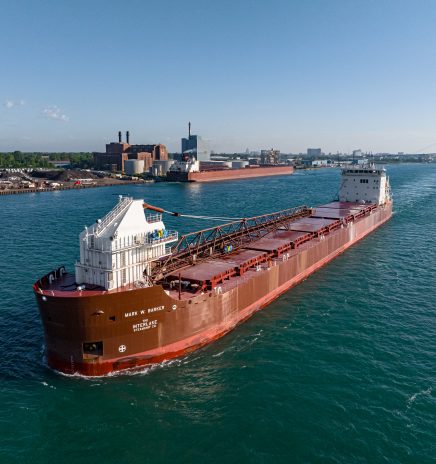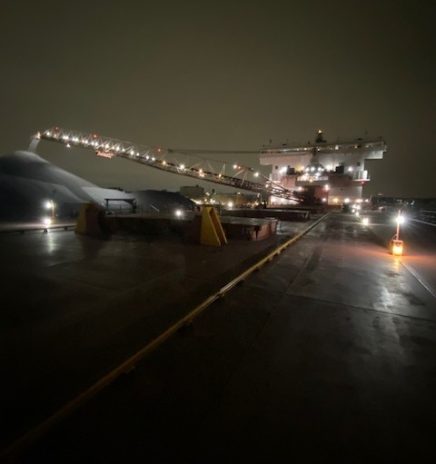U.S. Tariff Impact on Great Lakes Shipping
This latest development came after President Trump delayed 25 percent tariffs on most imports from Canada and Mexico until April 2. The tariffs originally took effect on March 3, but after discussions with the leaders of both countries, President Trump announced the delay.A
According to the Aluminum Association of Canada, 75 percent of U.S. aluminum imports come from Canada. This accounts for more than 60 percent of the United States’ annual consumption.
Industry stakeholders on both sides of the Great Lakes have voiced their concerns regarding the tariffs. After the tariffs went into effect on March 3, Mark Fisher, president and CEO of the Council of the Great Lakes Region released a statement regarding how the Great Lakes would be impacted by the Canadian tariffs. “This decision, which runs counter to the new USMCA trade agreement, will raise the cost of doing business for American companies and will increase prices for consumers at a time when families are facing affordability challenges and the economy is recovering from years of higher inflation due to the global health pandemic.
The eight Great Lakes states, which export close to US$135 billion to Canada every year or 40 percent of all U.S. exports to Canada, will be hit the hardest by these tariffs and the retaliatory measures imposed by Canada in response.
As a result, CGLR strongly encourages the Trump administration to withdraw these unnecessary and unjustified tariffs and to work with Canada to resolve ongoing trade issues in a more constructive manner and within the framework of the USMCA.”
Other Stakeholders Respond
On February 6, the Chamber of Marine Commerce hosted its first webinar of 2025, with Douglas J. Porter, chief economist of BMO Financial Group, speaking about the impact of potential tariffs on the United States, Canada and the rest of the world.
“No one wins; it is bad news for the economy, and it doesn’t matter which side of the border you are on,” Porter said. “It puts upward pressure on inflation and downward pressure on growth.”
Porter believes the auto industry is the most vulnerable sector in the trade war. He also believes tariffs would put pressure on the Great Lakes maritime industry. “Anything related to manufacturing, such as automotives and metals—these sectors are all dependent on the maritime industry,” Porter said. “As these sectors feel the effects of tariffs it would impact trade on the Great Lakes. However, I think the U.S. and Canadian governments would look at supplying support to industries that would be directly affected by the tariffs.”
Economists like Porter predict the tariffs could push Canada and Mexico into a recession. The tariffs would likely reduce the U.S. gross domestic product (GDP) by 0.5 percent and increase inflation in all three countries. The tariffs are expected to have a negative impact on the U.S. economy, leading to higher food and new vehicle prices.
The American Association of Port Authorities (AAPA) released the following statement in anticipation of the possible tariffs.
“Tariffs are taxes,” stated Cary S. Davis, AAPA president and CEO. “Though the port industry supports President Trump’s efforts to combat the flow of illicit drugs, tariffs will slow down our supply chains, tax American businesses and increase costs for hard-working citizens. Instead, we call on the Administration and Congress to thoughtfully pursue alternatives to achieving these policy goals and exempt items critical to national security from tariffs, including port equipment.”
John Murphy, senior vice president and head of international at the U.S. Chamber of Commerce, said, “The President is right to focus on major problems like our broken border and the scourge of fentanyl, but the imposition of tariffs under IEEPA is unprecedented, won’t solve these problems, and will only raise prices for American families and upend supply chains. The Chamber will consult with our members, including main street businesses across the country impacted by this move, to determine next steps to prevent economic harm to Americans. We will continue to work with Congress and the administration on solutions to address the fentanyl and border crisis.”
The United Steelworkers (USW) issued a statement opposing the Canadian steel and aluminum tariffs. “Steel and aluminum serve as the backbone of our critical infrastructure and national security, and strong domestic industries have for generations enabled our nation to build bridges, supply power, outfit our military and more.
Our union welcomes President Donald Trump’s efforts to contain the global overcapacity that has for too long enabled bad actors like China to flood the global market with its unfairly traded products, resulting in surging imports into the United States, especially from Mexico.
At the same time, we must distinguish between trusted trade partners, like Canada, and those who are seeking to undercut our industries as they work to dominate the global market.
Canada is not the problem. Indeed, Canada has taken steps to coordinate their trade policies with the U.S. to respond to unfair foreign trade, and applying across-the-board tariffs ultimately hurts workers on both sides of the border.
While our union absolutely views tariffs as one of many important tools we need to employ to rebalance our trade relationships, we urge a measured approach that both strengthens our manufacturing sector and accounts for our relationships with our allies, like Canada, who play by the rules.”
Many U.S. steel manufacturers and stakeholders support the steel tariff, hoping higher Canadian steel prices will drive customers to American steel and aluminum companies. Aluminum Association President Charles Johnson released a statement.
“We appreciate President Trump’s continued focus on strong trade actions to support the aluminum industry in the United States. During his first term the president was early to recognize the genuine threat that non-market actors pose to U.S. manufacturing industries like ours … Today, there is not enough smelting capacity in the United States to supply the growing aluminum industry with the input materials it needs.”
Austin Bonta, Mayor of Portage, IN, and Mat Siscoe, Mayor of St. Catharines, ON, recently issued a statement on behalf of the Great Lakes and St. Lawrence Cites Initiative.
“As the clock winds down to the possible imposition of a blanket 25 percent blanket tariff on Canadian exports to the United States, followed by anticipated reciprocal actions by the Government of Canada, we add our voices to the growing chorus of American and Canadian leaders, who oppose the prospect of harmful trade war between our two countries. Our region, with the beautiful Great Lakes and mighty St. Lawrence River, is a potent symbol of cross-border cooperation, friendship and ingenuity. Together, as sovereign nations, we’ve built a highly integrated economy worth US$6 trillion and more than (Can)$8 trillion–the third largest in the world.
Together, we’ve built a Seaway that connects the economic centers of both countries and the industrial heartland of our continent to global commerce. The economic engine of the Great Lakes and St. Lawrence River Region supports over 50 million jobs that our residents count on.
The livelihoods of millions cannot be put at risk by putting these jobs in jeopardy. Our lakes and rivers propel our enterprises and entrepreneurs, and dynamic workforce. Working together, we have forged leading industries, companies and multi-billion-dollar supply chains that span our borders. Our connected manufacturing, agri-food, energy and transport sectors supply the United States, Canada and the world. We must not let a trade war destroy this remarkable bilateral relationship we have built over the centuries.
Make no mistake, we share a commitment to protecting American and Canadian workers, companies and communities. We also believe that we can work together to strengthen our border, drive shared economic prosperity and provide stability and security in these uncertain times. A trade war undermines these shared goals.
We commend all the municipal leaders, premiers and governors, labor groups and business leaders from our region who have spoken out against the prospect of blanket tariffs and who value our mutually beneficial trade relationship. We urge both federal governments to work together to avoid any negative economic impacts.”

Advancing Agricultural Prosperity Among Great Lakes Shippers and Suppliers
Meeting for the second time in Grand Rapids, Michigan, on Dec. 4, 2025, the Great Lakes Alliance for Sustainable Shipping (GLASS) drew more than 80 attendees from across the Midwest agriculture and transportation industries. Those attending included trucking companies, marine... Read More

Great Lakes Iron Ore Trade Nearly Matches January 2025
Iron Ore shipments on the Great Lakes totaled 2 million tons in January. According to the Lake Carriers’ Association, this total is a near match to 2025. Loadings were below... Read More



